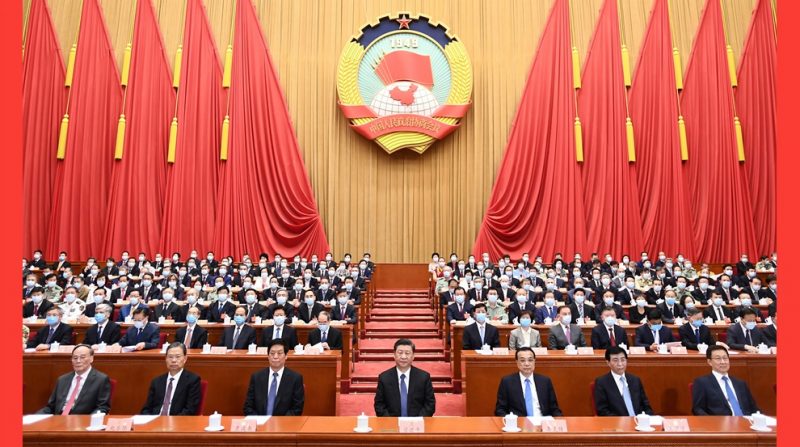The so-called ‘two sessions’ in China to determine the economic, social, diplomatic policies that are going to be implemented by the government were concluded while this article was being written. The meetings are those of China’s top legislature, the National People’s Congress (NPC), the country’s top political advisory body – the Chinese People’s Political Consultative Conference (CPPCC).
It is obvious that the effect of the decisions that guide the world’s largest economy in terms of purchasing power are not limited by borders. As the coronavirus outbreak continues to drag the world into greater uncertainty, China’s decisions have captured the attention of a world looking for answers. While the world press and research institutions are scrutinizing the conclusions, Turkish media closed their eyes and preferred not to hear the news. The ignorance and indifference to hina in Turkey deserves a separate in depth examination.
KEY CONCEPTS
It was a brave move to gather more than five thousand representatives in Beijing for the National Congress and People’s Political Consultative Conference. Chinese administrators took highly effective precautions calmly and self-assuredly, unlike the Western countries. The reason for this was not cultural difference, but the fact that China’s financial and social system are planned and thus more durable against such crises.

Xi Jinping, President of China and General Secretary of the Communist Party of China, attended the joint sessions of the Committee for Economic Affairs and Committee of Population, Resources and Environment of the CPPCC, and gave an important speech on the morning of May 23. General Secretary Xi reminded the representatives of the efficiency, strength and economic potential of China. Xi emphasized that the fundamental policies and characteristics of the Chinese economy remain unchanged, but said the government does have a lot of space to maneuver.
Flexibility is one of the central elements that grant a government the ability to navigate a crisis. However, the determinant factor is the infrastructure and human source investments of a country, as well as a government’s ability to act independently. This solid foundation was what made China confident despite losing 6.8% economic drop in the first quarter of the year.
PREMIER’S REPORT
The most important text that came to the fore during the meetings was the report on government work presented by Premier Li Keqiang.
In another article, we will consider the assessments of relations with the US in the Government Report, the Taiwan problem, the increase of the defense budget by 6.6%, the Security Law of Hong Kong and international relations.
The essence of the report determines how to improve the post-coronavirus Chinese economy. In this article, we will consider the proposed policies.
In the study report, 17 priority objectives concerning the life of the public were determined:
1- At least 9 million new jobs will be created in urban and rural areas. The measured unemployment rate will be maintained at around 6% and the registered unemployment rate at around 5.5%.
2- Consumer prices will be kept at 3.5%.
3- Population under absolute poverty will be zeroed.
4- Fiscal deficit rate will be at least 3.6%.
5- 1 trillion Yuan ($ 140 billion) of special government bonds will be issued.
6- Tax and social insurance burden for businesses will be reduced by 2.5 trillion Yuan (350 billion dollars).
7- Citizens’ income growth and economic growth rate will be maintained in a balanced manner.
8- Broadband internet and private line fees will be reduced by an average of 15%.
9- Credit growth rate of big commercial banks to SMEs will exceed 40%.
10- 35 million people will receive vocational skills training this year and next year, and higher vocational schools will receive an additional 2 million students.
11- 3.75 trillion Yuan ($ 525.5 billion) local private bonds will be issued for infrastructure investments of the state.
12- Yuan 100 billion ($14 billion) of capital will be increased for railway construction.
13- Over 5 million hectares of high-standard agricultural land will be opened due to the obligation of China to supply food to 1.4 billion Chinese people through the country’s own efforts.
14- China pensions 300 million people every year. China will increase basic pensions and minimum basic pensions for retirees.
15- China will adhere to the principle of “housing is not for speculation, but for living”. The country will implement urbanization-specific policies to support the stable and healthy development of the real estate market.
16- China will give priority to preventing air pollution in a legal, scientific and targeted way, which negatively affects the living conditions of the people.
17- China will improve the consumption desire of the people, increase the purchasing power and accelerate the development of the domestic market by supporting the strengthening of the retail sectors.
ZERO POVERTY
The main theme of the report can be summarized as job creation and poverty reduction.The first point focuses on job security and enlarges the domestic market, while the second aims at zero absolute poverty.
China will have zeroed absolute poverty by the end of this year. Thus, the aim set in the United Nations 2030 Sustainable Development Agenda will have been reached 10 years in advance. This is also a very important contribution of China to poverty reduction on a global scale. Zeroing poverty is the primary condition for establishing a “Moderately Prosperous Society from All Respects”. With these central public moves, China is walking steadily towards the goal of zeroing absolute poverty despite the nay-saying experts of the West.
NINE MILLION NEW JOBS
Creating the 9 million new jobs laid out in the government report will be a challenge. Based on the experimental data from previous years in China, it can be said that every percent increase in growth rate corresponds to about two million new jobs. According to this calculation, China can be expected to develop at least 4.5% this year. However, there is no linear relationship between growth and employment. For example, China’s GDP decreased by 6.8% in the first quarter, while 2.3 million new jobs were added.
Giving priority to employment by economic management can provide employment without decreasing labor productivity.
Providing stability in employment is the first condition for improving the lives of the people in China. The largest part of the population is the large working masses: employment provides the people with a stable livelihood, which is the main factor that supports economic development. Labor income is an important source of income for many rural residents and an important tool for poverty reduction.
Helping businesses, especially SMEs, is important to ensure employment security. More than 80% of employment in China is provided by small and medium-sized enterprises. On the other hand, we should remember that the scale of SMEs in China is 10 times bigger than in Turkey.
THE BASIS OF THE ECONOMY IS A BETTER LIFE FOR THE PEOPLE
The report adopts a strategy to expand domestic demand, taking into account the need to cope with the pressing challenges of the pandemic, the importance of meeting the growing needs of people with long-term, sustainable and sound economic development. The Chinese government has not ceased to promise the people a better life.
Of course, the popularist priority is to increase the income of the working people. When people’s livelihoods are provided for, the roots of economic and social development are strengthened. When the basic living needs of the people are met, the profitability of the enterprises is secured, consumption is balanced, and economic development is encouraged.
There is a popular plan that nourishes and integrates each other. The report therefore focuses on deepening supply-side structural reform, improving people’s well-being and increasing consumption and investment in a more coordinated, mutually empowering way.
It is noted that the imbalance of economic development in different regions of China also provides great potential for economic growth. It shows that there are still large areas to go to expand domestic demand. The construction of “new infrastructure, new urbanization initiatives and large projects” stated in the report is a vital measure that helps not only prioritize the welfare of people but also supports the expansion of domestic demand. The share of consumption in economic growth in China is 64%: the expansion of domestic demand is also the guarantee of economic growth.
After China’s per capita income exceeded $10.000, many citizens increased demand for higher quality products. Production must keep up with this demand. The market forces businesses to produce higher quality products. The increase in domestic demand required the supply system of the entire industry and service sector to rise simultaneously. This forced the economy to leap to a high level of dynamic balance.
The ultimate goal of expanding domestic demand also focuses on improving people’s living standards. This practice means placing people at the center of the economy in China, which entails populism.
WHY HAS NO NEW GROWTH TARGET BEEN SET?
This year, China has not announced its growth target for the first time in the “Reform and Opening Out” period that started in 1978. This situation was explained by the authorities who said “We are focusing everyone’s enthusiasm, attention and energy on increasing the welfare of the people and protecting existing businesses.”
Another important development of the New Era of China-Specific Socialism was announced by Xi Jinping, who said the Chinese economy was moving from the period of “rapid growth” to one of “high quality development”. In other words, China has announced that it is moving away from the GDP-driven growth model.
PEOPLE’S DEMOCRACY
According to the Western press and some of our China ‘experts’, the meetings of the China National People’s Assembly and the China People’s Political Advisory Conference are only the body to certify the decisions taken by the center. However, the “Two Sessions” is a process in which people in China actively participate at all levels and convey their opinions and suggestions. Democracy, which means that the people have a say and decision, is thoroughly implemented through original mechanisms in China.
The Government Report read by Premier Li does not only reflect the views of CCP Central Committee and State Council members and ministers. The first draft of the report was comprehensively prepared at the beginning of March, at which point a call was made on the internet for the public to comment. Over 100,000 suggestions, criticisms and complaints came. The government’s official website, china.gov.cn, chose to publish 1,400 of these suggestions. Contributions were received not only from the public, but also from foreign experts. 13 renowned experts from nine countries proposed “extraordinary views and suggestions from a global perspective and international comparison perspective”.
The Report Draft prepared before the Chinese Spring Festival has changed significantly in terms of form and content. Some of the sections in the report have completely changed. 14,000 suggestions and opinions regarding the Report were also gathered at the Chinese People’s Political Consultative Conference (CPCC) and the Chinese National People’s Congress (NPC). Based on all these contributions, the Chinese State Council will publish the 2020 Working Paper.
CONCLUSION: GROWTH IS A MEANS, NOT AN AIM
At a time when the coronavirus crisis is shaking the world, the content of the report discussed in China and the global reflections of the new decisions taken will become more evident in the coming days. Growth rates and GDP figures show only results, not the direction of development. Of course, China will not lose its direction due to a lack of a growth target. The spokesperson of the State Council Information Office Hu Kaihong summarizes China’s new term policy as follows: “Together with Comrade Xi Jinping, we will implement the new development philosophy in line with the decisions and plans of the CCP Central Committee, we will continue to supply structural reforms and promote high quality development.”
In other words, in China, growth does not mean inflating the market through supply, it is an imperative to meet the needs of the public.

















Leave a Reply